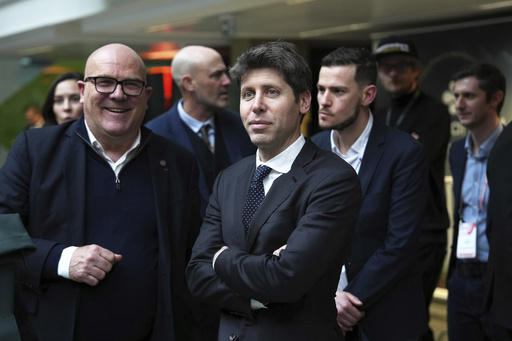
In a recent development, OpenAI’s CEO, Sam Altman, has outright rejected a proposed takeover offer valued at $97.4 billion from competitor Elon Musk. This unsolicited bid presents potential challenges for Altman’s ambition to transition OpenAI, the company renowned for its ChatGPT technology, into a for-profit entity. Altman made it clear during an AI summit held in Paris, stating, “We are not for sale.”
Musk’s offer, which was disclosed on Monday, marks the latest chapter in a contentious rivalry that has been brewing for several years between him and Altman. Both were instrumental in establishing OpenAI as a nonprofit ten years ago, and now it stands at the forefront of the growing generative AI sector. During discussions on stage with France’s AI minister, Altman emphasized OpenAI’s mission with regard to artificial general intelligence (AGI) and reiterated their commitment to ensuring its benefits reach all of humanity.
Since its inception in 2015, OpenAI has aimed to cautiously advance the development of AGI, which seeks to surpass human capabilities. Musk originally joined as a founding investor and board member but departed the organization in 2018 after an internal dispute that solidified Altman’s leadership. The ongoing tension between the two has intensified this past year, as Musk has initiated legal actions against OpenAI while simultaneously expanding his AI venture, xAI, which complements his extensive business portfolio, including Tesla and SpaceX. Additionally, Musk’s political involvement as a key advisor raises questions about his intentions regarding OpenAI’s direction and initiatives.
The implications of Musk’s bid could complicate OpenAI’s strategy of evolving from its nonprofit beginnings to a profit-driven organization. The board responsible for OpenAI’s nonprofit structure must deliberate on Musk’s proposal. It’s worth noting that the decision isn’t solely in Altman’s hands; Bret Taylor, the board chair, also affirmed during a Wall Street Journal event that “OpenAI is not for sale,” describing Musk’s approach as a potential distraction from their commitment to their mission.
Taylor articulated that the board’s fiduciary responsibility is to ensure that every strategic move aligns with the mission of enhancing humanity through AGI. The board faces a complex evaluation, weighing not merely financial assets but also the vital control over the future of a technology regarded as transformative. Furthermore, Musk’s bid may establish a baseline for the potential compensation if the nonprofit decides to relinquish its controlling stakes.
Experts like Rose Chan Loui from UCLA emphasize that the board must critically assess Musk’s offer, particularly regarding the implications of a new governance structure under his influence and the independence and mission assurances that would accompany it. Musk’s acquisition of Twitter in 2022 similarly began with an unsolicited approach, although acquiring OpenAI could pose more legal challenges due to its established charitable objectives.
Legal scholars have stated that OpenAI’s nonprofit status includes a legally binding commitment to serve public interests, which may be jeopardized if the organization were to sell off its assets. Musk’s prior lawsuit against OpenAI alleges that the organization has strayed from its foundational goals, fueled by claims of betrayal regarding its nonprofit aims. Legal representatives for both parties convened in a California federal court recently to address Musk’s plea aiming to halt OpenAI’s transition to a profit-focused model. While the judge has not yet reached a decision, her remarks suggested that Musk’s assertions of potential harm might not be compelling enough to warrant immediate action.
Support for Musk’s takeover attempt extends beyond him and xAI, with backing from notable investment groups like Baron Capital Group and Valor Management. Musk’s attorney conveyed the necessity for OpenAI’s charitable wing to receive just recompense if it were to allow external investors to control its pivotal technology. Altman reassured OpenAI employees that the current structure safeguards against any singular individual gaining control, framing Musk’s bid as a rivalry-driven tactic.
In providing insight into their relationship, Altman reflected on Musk’s disposition, suggesting that he may be struggling with personal insecurities, reinforcing the depth of their ongoing, very public feud.
This complex and evolving situation continues to attract scrutiny as both companies navigate their respective paths amid an increasingly competitive AI landscape.

